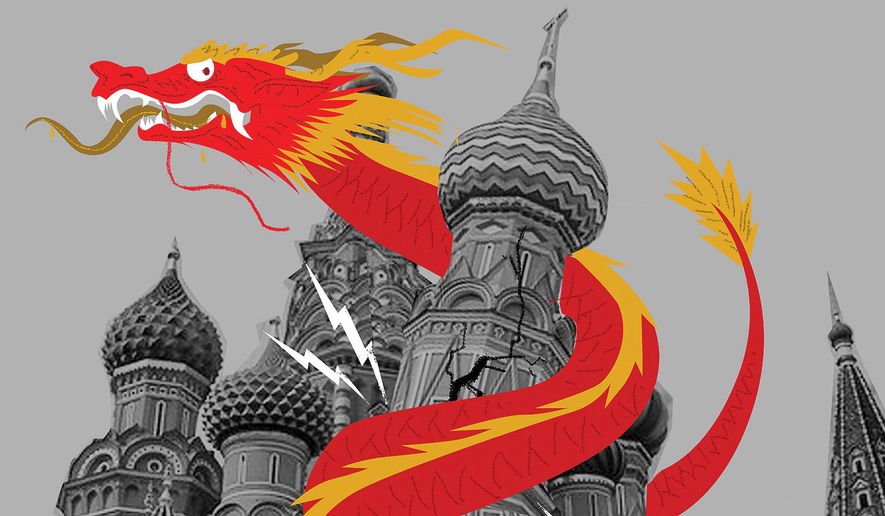OPINION:
One year into the most devastating war in Europe since World War II, China is ruthlessly focused on taking maximum advantage of a weakened Russia and an isolated Vladimir Putin. For Beijing, Russia’s massive, unexpected reverses on the battlefield since invading Ukraine in February 2022 offer an opportunity to dominate the Kremlin and turbo-boost its own grand strategy of becoming the world’s dominant power by 2049.
Mr. Putin and Chinese President Xi Jinping have met over 40 times since Mr. Xi came to power in 2012, relentlessly ratcheting up bilateral ties to challenge a U.S.-dominated “unipolar” world. Their armies routinely conduct major military exercises. They share intelligence and regularly coordinate their policies and messages against the U.S., NATO and the international rules-based order they seek to overthrow.
At a virtual summit in December, Mr. Putin described Russia’s relationship with Communist China as “the best in history” and invited Mr. Xi to visit Moscow this spring. Just before last year’s invasion, the two famously declared their partnership of dictators had “no limits.”
But among the many lessons to be gleaned so far from Russia’s murderous war on Ukraine is that today’s purported Sino-Russian alliance — just like the Soviet Union’s with Communist China in the last century — has clearly definable limits and, in many spheres, elements of outright competition.
And unlike during the Cold War, it’s China that is setting the boundaries this time. It is clear that Mr. Xi wants to win big at the expense of his “ally.”
Seeking to avoid secondary sanctions, China supports Russia diplomatically and with its Orwellian propaganda machine but provides Russia with none of the military equipment Moscow so desperately needs. Russia’s defense industrial base is struggling, but the Kremlin has been forced to rely on Iran for drones and North Korea for artillery rather than China, supposedly Russia’s “most important strategic partner,” in Mr. Putin’s words.
Russia began reorienting its economy to China after the West imposed sanctions in response to the illegal annexation of Crimea and invasion of eastern Ukraine in 2014. China is now poised to supplant the European Union as Russia’s primary economic partner.
China is importing Russian hydrocarbons at reduced prices and capturing Russia’s market for strategic commodities for both high technology and manufactured goods. In 2022, China’s oil, gas, liquefied natural gas, and coal imports from a cash-desperate Russia topped $60 billion, up $41 billion from 2021.
The result is a massive trade imbalance and a Russian economy that is increasingly dependent on China, while Beijing, by contrast, enjoys exceptionally diverse commercial relationships around the globe.
With Mr. Putin’s attention — and his struggling armies — focused on Ukraine, China has seized the opportunity to encroach on Russia’s traditional sphere of influence in Central Asia. In September 2022, Mr. Xi made a rare visit to Tashkent, Uzbekistan’s capital, to attend the Shanghai Cooperation Organization summit. China is aggressively developing a strategic economic and strategic partnership with that country.
Kazakhstan has become a bridgehead for China’s “Belt and Road” financing initiative, including promoting Chinese construction projects. China’s imports of Kazakh oil increased by over 400% last year, and Mr. Xi pointedly and publicly defended Kazakhstan’s decision to stay neutral rather than support Russia’s war on Ukraine.
Desperate to preserve his regime, Mr. Putin has made a Faustian bargain with his country’s long-term strategic competitor. As long as Mr. Putin remains in power, Russia will be economically and strategically subservient to China, the junior partner to an increasingly powerful Beijing.
Mr. Putin claimed his “special military operation” in Ukraine would be completed in a matter of days. Instead, one year into his misguided war of choice, Russia has spilled massive blood and treasure, will have to contend with an expanded NATO with new members on its border and has become an easy mark for Chinese exploitation.
The Russians have a saying: “Svaya rubashka blizhe k telu” — “One’s own shirt is closest to one’s skin.” China, over the past year, has been acting in its own self-interest — one that is counter to Russia’s national interests.
Ukraine has sacrificed more and accomplished more to halt Russia’s brazen aggression than any NATO member in the history of the alliance. And Kyiv is demonstrating to Mr. Putin’s detractors and his inner circle the folly of the decision to rely so heavily on Chinese goodwill in the fight.
NATO, of course, must carry on as the arsenal of democracy, supporting Ukraine’s right to self-defense and preventing a nuclear-armed state from successfully winning a war of territorial aggrandizement. But let’s also keep in mind that this strategy can also serve our interests in another major way by exposing, stressing and puncturing the faux Sino-Russian “alliance.”
• Daniel N. Hoffman is a retired clandestine services officer and former chief of station with the Central Intelligence Agency. His combined 30 years of government service included high-level overseas and domestic positions at the CIA. He has been a Fox News contributor since May 2018. Follow him on Twitter @DanielHoffmanDC.




Please read our comment policy before commenting.